Key Takeaways
- Emirati Cuisine Essentials: Discover must-try traditional dishes like Machboos, Harees, and Luqaimat, and learn where to find the most authentic flavors in this comprehensive Dubai food guide.
- Global Culinary Hub: Explore Dubai’s international food scene, from Michelin-starred restaurants by celebrity chefs to humble, world-class street food from every corner of the globe.
- Modern Food Halls & Markets: Navigate the city’s trendy food halls like Time Out Market and Depachika for a curated taste of local and global eats under one roof.
- Street Food & Hidden Gems: Uncover the best budget-friendly bites, from sizzling shawarma in Deira to delicious Karak chai in local cafeterias that are loved by residents.
- Practical Dining Tips: Get insider advice on dining etiquette, alcohol consumption, tipping culture, and how to navigate the city’s diverse culinary landscape like a local.
 Introduction
Introduction
Welcome to Dubai, a city where shimmering skyscrapers touch the clouds and ancient desert traditions meet futuristic innovation. But beyond the architectural marvels and luxurious shopping, the true heart of Dubai beats in its kitchens. The city’s culinary scene is a vibrant, ever-evolving tapestry woven from the threads of hundreds of cultures. To eat in Dubai is to take a journey around the world on a single plate, a story told through spice, flavor, and shared meals.
As a local who has watched this city’s food culture blossom, I can tell you that there’s no better way to understand Dubai than through its food. It’s a place where you can start your day with a traditional Emirati breakfast in a quiet courtyard in Old Dubai and end it with a Michelin-starred meal overlooking a glittering skyline. This is not just a city that eats; it’s a city that celebrates food in all its forms.
This Dubai food guide is your personal invitation to explore the tastes that define my home. We’ll move beyond the tourist traps and dive deep into bustling souks, hidden gem cafeterias, elegant dining rooms, and lively food halls. Before you start dreaming of the flavors, securing your flights to this desert oasis is the first step toward an unforgettable gastronomic adventure. Get ready to loosen your belt and open your mind—your culinary journey starts now.
Understanding Dubai’s Food Scene
To truly appreciate what to eat in Dubai, you have to understand its story. Not so long ago, this was a humble fishing and pearling village. The local diet was simple, based on what the land and sea provided: fish, camel milk, dates, and spices brought by traders. This Bedouin heritage forms the bedrock of Emirati cuisine, emphasizing hospitality and hearty, communal meals.
Then came the oil boom and the city’s meteoric rise. Dubai transformed into a global crossroads, attracting people from over 200 nationalities who brought their recipes with them. The city’s food scene exploded, absorbing influences from the Levant, Persia, India, and beyond. This fusion is what makes dining here so exciting; it’s a living history of the city’s growth.
Today, Dubai’s culinary identity is a dynamic blend of heritage and hyper-modernity. You’ll find chefs preserving age-old Emirati recipes in cultural heritage sites, while just a few miles away, world-renowned culinary artists are pushing the boundaries of gastronomy. This delicious contrast between the old and the new, the local and the global, is the essence of Dubai’s food culture.
Traditional Emirati Dishes to Try
Exploring Emirati cuisine is the most authentic way to connect with Dubai’s soul. These dishes are rich, aromatic, and designed for sharing. One of the most beloved is Machboos, a fragrant rice dish slow-cooked with tender meat (usually lamb or chicken), onions, and a blend of spices called bezar. It’s the quintessential comfort food and a staple at any family gathering.
Another must-try is Harees, a simple yet profound dish with a porridge-like consistency. It’s made by slow-cooking wheat and meat together for hours until they meld into a savory, creamy concoction, often topped with a drizzle of ghee. It’s particularly popular during Ramadan and special occasions, symbolizing community and togetherness.
For a sweet finish, you cannot miss Luqaimat. These are small, deep-fried dumplings that are crispy on the outside and soft on the inside. Once cooked to a golden brown, they are drenched in date syrup (dibs) and sprinkled with sesame seeds. To experience these dishes in a truly authentic setting, consider a cultural meal at the Sheikh Mohammed Centre for Cultural Understanding, where you can learn about the traditions behind the food.
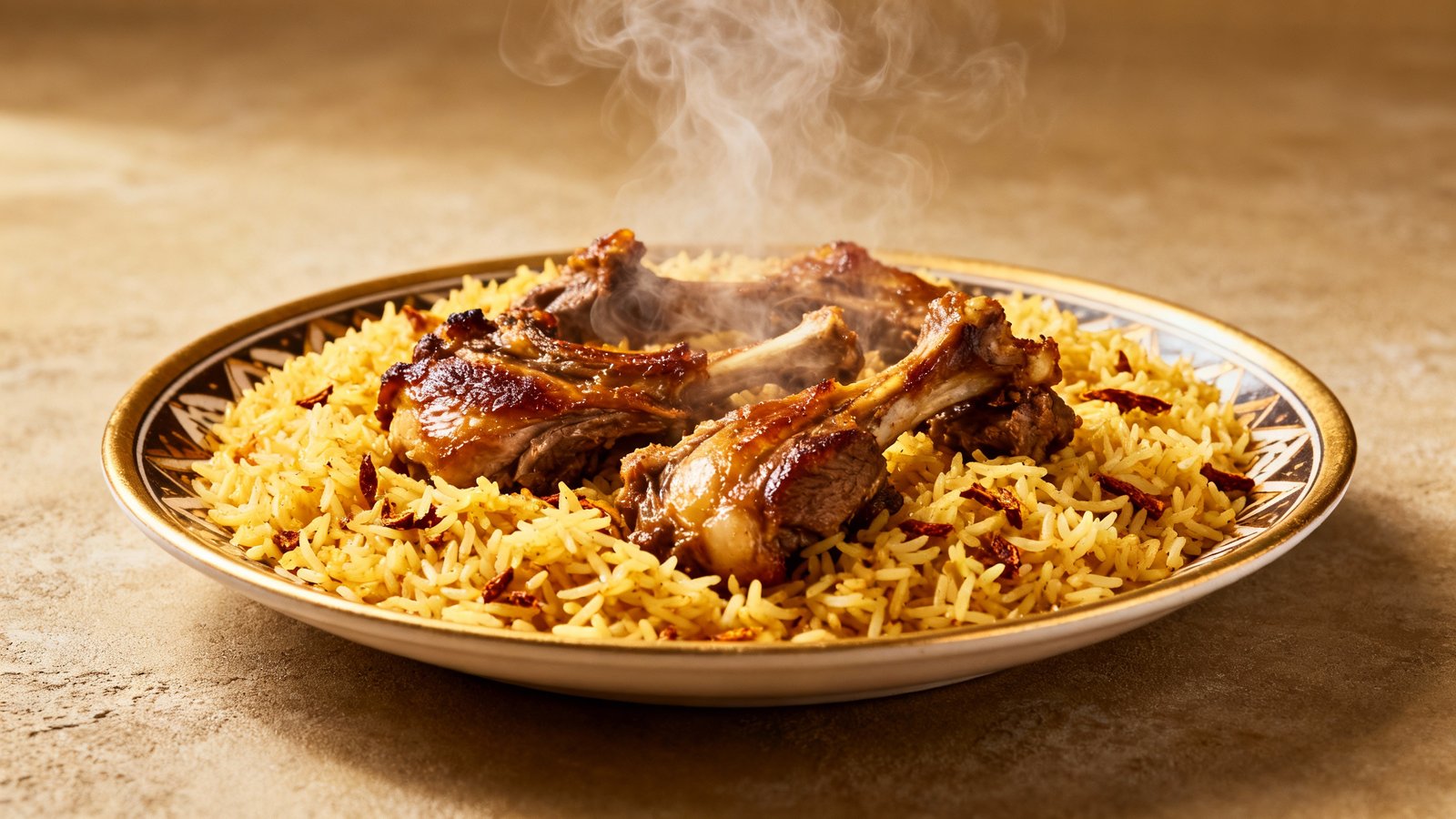
Middle Eastern Favorites
While Emirati food is the heart of local cuisine, Dubai is also a fantastic place to sample the greatest hits from across the Middle East. The city is packed with eateries serving up Levantine classics that have become staples for residents and visitors alike. The most famous of these is undoubtedly the Shawarma, a wrap of thinly sliced, marinated meat cooked on a vertical rotisserie, stuffed into a pita with garlic sauce, pickles, and fries.
Equally ubiquitous is Falafel, crispy fried balls of ground chickpeas or fava beans, and Hummus, the creamy chickpea and tahini dip that needs no introduction. You’ll find them served as part of a mezze platter—a collection of small appetizers that might also include moutabel (smoky eggplant dip), tabbouleh (parsley salad), and stuffed vine leaves.
For a quick, savory snack, look for a bakery selling Manakish, a type of flatbread topped with za’atar (a thyme and sesame spice blend), cheese, or minced meat. For a taste of some of the city’s most legendary street-style Middle Eastern food, a late-night visit to Al Mallah is a rite of passage for any food lover in Dubai.
Best Places for Local Cuisine
To find the most authentic Emirati food, you need to venture into the older parts of the city. The Al Fahidi Historical Neighbourhood, with its beautifully restored wind-tower houses and quiet courtyards, is the perfect backdrop for a traditional meal. Here, you can escape the city’s frantic pace and dine in an atmosphere that feels a world away from the modern metropolis.
Another fantastic area is Al Seef, a waterfront promenade along the Dubai Creek that cleverly blends old-world architecture with contemporary design. Restaurants here offer stunning views of the passing abras (water taxis) and dhows, creating a magical dining experience, especially at sunset. It’s a popular spot for both locals and tourists looking to enjoy a meal with a sense of place.
For a truly immersive experience, head to Al Fanar Restaurant & Cafe, which has locations in Al Seef and elsewhere. Designed to look like Dubai in the 1960s, it offers a nostalgic journey back in time. The menu is a comprehensive guide to Emirati cuisine, serving up generous portions of everything from Machboos to Balaleet (sweet vermicelli with eggs) in a setting that is both charming and educational.
Street Food Adventures
Dubai’s street food scene is where you’ll find some of its most exciting and affordable flavors. While not concentrated in street-side stalls as in other countries, it thrives in bustling neighborhoods, night markets, and dedicated food truck parks. One of the best places to explore is 2nd December Street (formerly Al Dhiyafa Street) in Satwa, a vibrant strip lined with cafeterias serving everything from shawarma to fresh fruit cocktails.
For a global street food extravaganza, nothing beats a trip to Global Village during the winter months. This massive multicultural festival park features pavilions from dozens of countries, each offering its own authentic street food. You can sample Bosnian kebabs, Yemeni Mandi, Thai curries, and Indian chaat all in one evening. It’s a true feast for the senses.
If you prefer a more modern take on street food, check out Last Exit, a series of quirky, American-style food truck parks located on the highways leading in and out of Dubai. Each park has a unique, Instagram-worthy theme, from post-apocalyptic to retro Americana. For a truly international experience, however, the food stalls at Global Village are an unmissable part of any Dubai food guide.
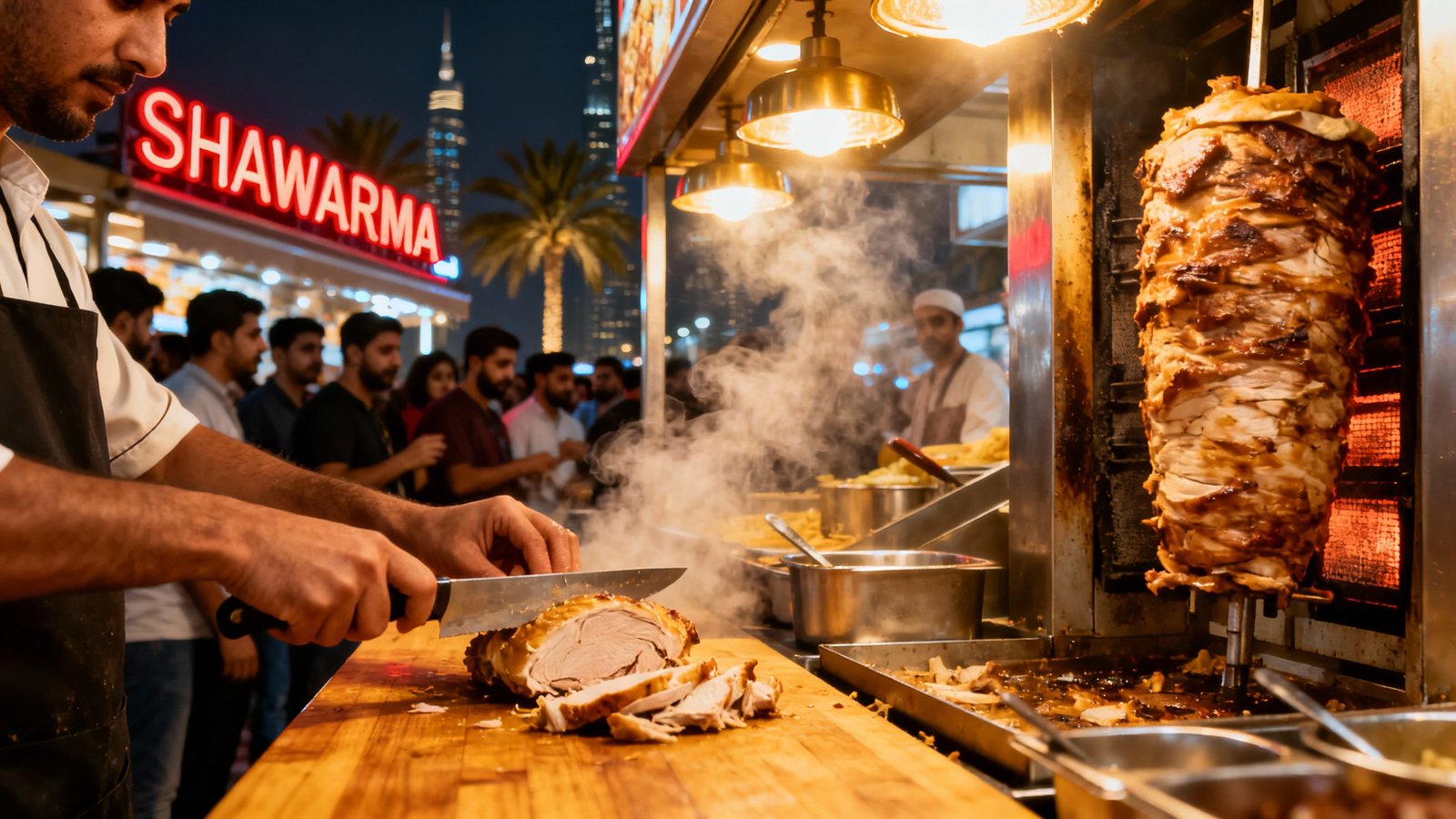
Global Dining Experiences
Dubai’s status as an international hub is most evident in its dining scene. The city is a magnet for world-class chefs and acclaimed restaurant brands, offering virtually every cuisine imaginable at an exceptionally high standard. Whether you’re craving authentic Neapolitan pizza, fiery Sichuan hotpot, or complex Peruvian ceviche, you will find it here, prepared by masters of their craft.
Many of the world’s most famous celebrity chefs have outposts in Dubai, making it a playground for discerning foodies. From Gordon Ramsay to Akira Back, these culinary titans have brought their signature concepts to the city, often housed within its most luxurious hotels. This has elevated Dubai’s dining scene to a global stage, earning it a growing number of Michelin stars.
Beyond the big names, the city is filled with incredible independent restaurants championing cuisines from around the world. You can find exceptional Japanese food at places like Zuma Dubai, which is consistently ranked among the best in the world, or explore the rich flavors of India at restaurants that range from humble canteens to fine-dining establishments. In Dubai, the world is truly your oyster (or your sushi, or your pasta).
Fine Dining & Rooftop Restaurants
When it comes to celebrating a special occasion or simply indulging in a spectacular meal, Dubai’s fine dining scene is second to none. The city’s penchant for luxury and grandeur extends to its restaurants, which offer not just exquisite food but also breathtaking settings and impeccable service. Many of these venues are architectural marvels in their own right.
Dining with a view is a quintessential Dubai experience. The city is famous for its rooftop restaurants and bars, which offer panoramic vistas of the glittering skyline, the Arabian Gulf, or iconic landmarks like the Burj Khalifa. Enjoying a meal from the 122nd floor of the world’s tallest building at At.mosphere or overlooking the Dubai Fountain from a terrace in Souk Al Bahar is an unforgettable experience.
For a romantic and truly unique setting, consider dining at a restaurant perched over the water. Venues in the Madinat Jumeirah complex, like the stunning Pierchic, are set on private piers extending into the Arabian Gulf, offering unparalleled views of the Burj Al Arab. These restaurants combine world-class cuisine with a magical ambiance that captures the essence of modern Dubai.
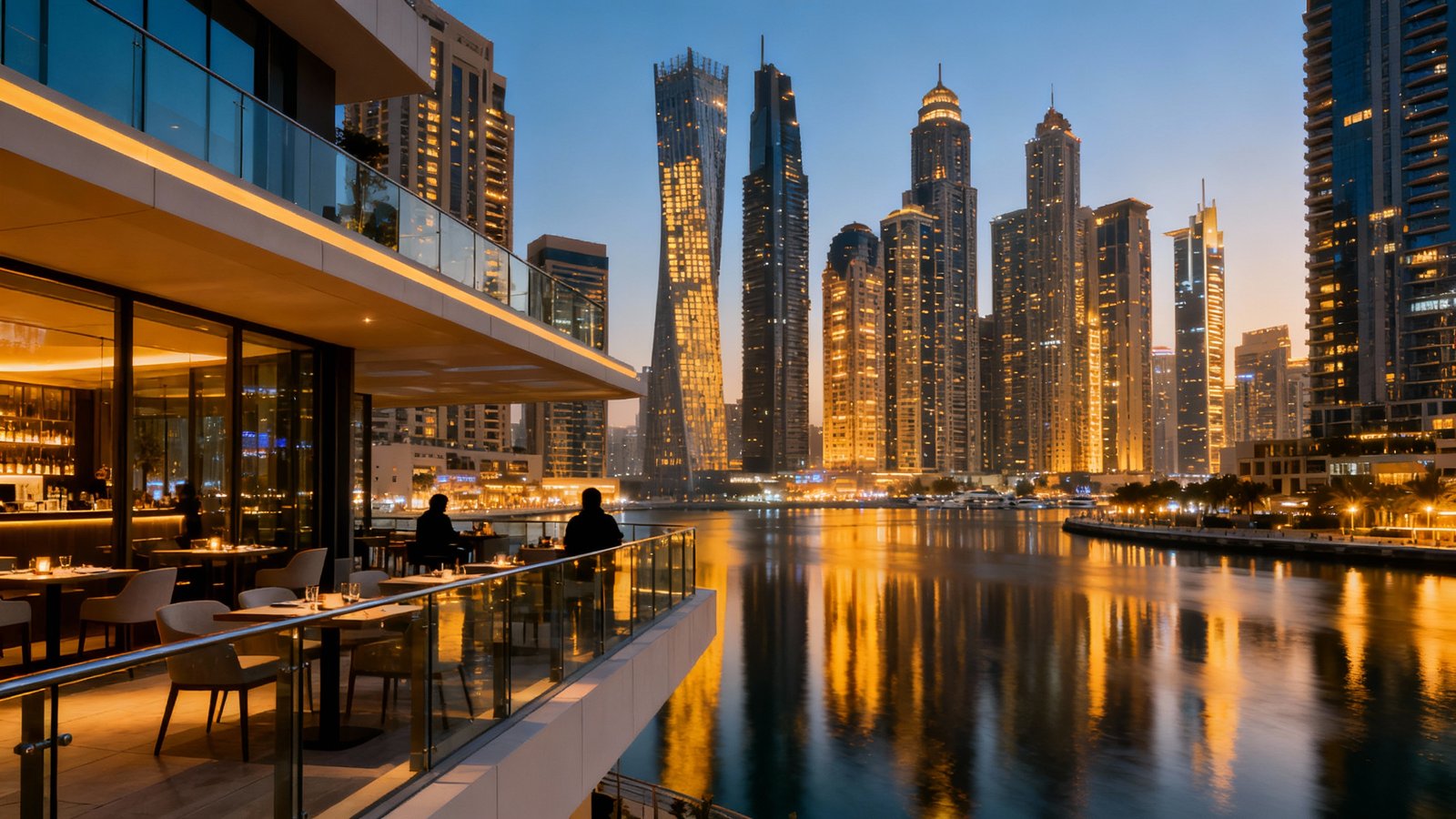
Best Food Halls & Modern Markets
In recent years, Dubai has embraced the global trend of curated food halls, and it has done so with typical flair. These modern markets bring together a diverse collection of the city’s best culinary concepts under one roof, offering a high-quality, casual dining experience. They are the perfect solution for groups who can’t agree on what to eat, as the choices are virtually endless.
The undisputed king of Dubai’s food hall scene is Time Out Market Dubai, located in Souk Al Bahar. It features a curated lineup of the city’s top homegrown culinary talents, all handpicked by the editors of Time Out magazine. With a huge terrace offering front-row seats to the Dubai Fountain show, it’s a dining destination that combines incredible food with an iconic view.
Another excellent option is Depachika Food Hall in Nakheel Mall on the Palm Jumeirah. Inspired by Japanese department store food halls, it offers a more retail-focused experience with a delicatessen, chocolatier, and fromagerie alongside dine-in options. For anyone looking to sample a wide variety of gourmet eats in a vibrant atmosphere, a visit to Time Out Market Dubai is a must.
Vegan & Vegetarian Options
Dubai’s food scene is becoming increasingly friendly to those following a plant-based diet. While traditional Middle Eastern cuisine is rich in vegetarian options like hummus, falafel, and moutabel, the city now boasts a growing number of dedicated vegan and vegetarian restaurants. These spots are pushing the boundaries of plant-based cooking, proving that it can be just as creative and delicious.
From healthy cafés serving açai bowls and green juices to fine-dining restaurants offering elaborate vegan tasting menus, there is something for every taste and budget. Areas like Jumeirah and Dubai Marina have become hotspots for healthy eating, with numerous eateries focusing on organic, locally sourced, and plant-forward ingredients.
One of the pioneers of the healthy eating movement in Dubai is Wild & The Moon, an all-vegan café with several locations across the city. They offer a menu of cold-pressed juices, smoothies, salads, and hot dishes that are all 100% plant-based, organic, and gluten-free. It’s a testament to how Dubai’s culinary landscape is constantly evolving to cater to every lifestyle.
Sweet Treats & Desserts
No culinary tour of Dubai would be complete without indulging in its incredible array of sweet treats. The region’s desserts are often rich, fragrant, and unapologetically sweet, using ingredients like honey, nuts, cheese, and rosewater. We’ve already mentioned the delightful Luqaimat, but the world of Arabic sweets goes much deeper.
One of the most popular desserts across the Middle East is Kunafa, a decadent pastry made with shredded phyllo dough or semolina, layered with a soft, unsalted cheese, baked until golden, and then soaked in a sweet syrup. It’s served hot and is a heavenly combination of crispy, gooey, and sweet. Another classic is Baklava, the famous pastry made of layers of filo filled with chopped nuts and held together with syrup or honey.
For something uniquely Dubai, try a dessert made with camel milk. Several cafés and ice cream parlors offer camel milk ice cream, which has a slightly saltier, nuttier flavor than regular ice cream. To explore a vast selection of regional sweets, a visit to a dedicated shop like Feras Sweets is essential. You can sample a little bit of everything and take home a beautifully packaged box of treats.
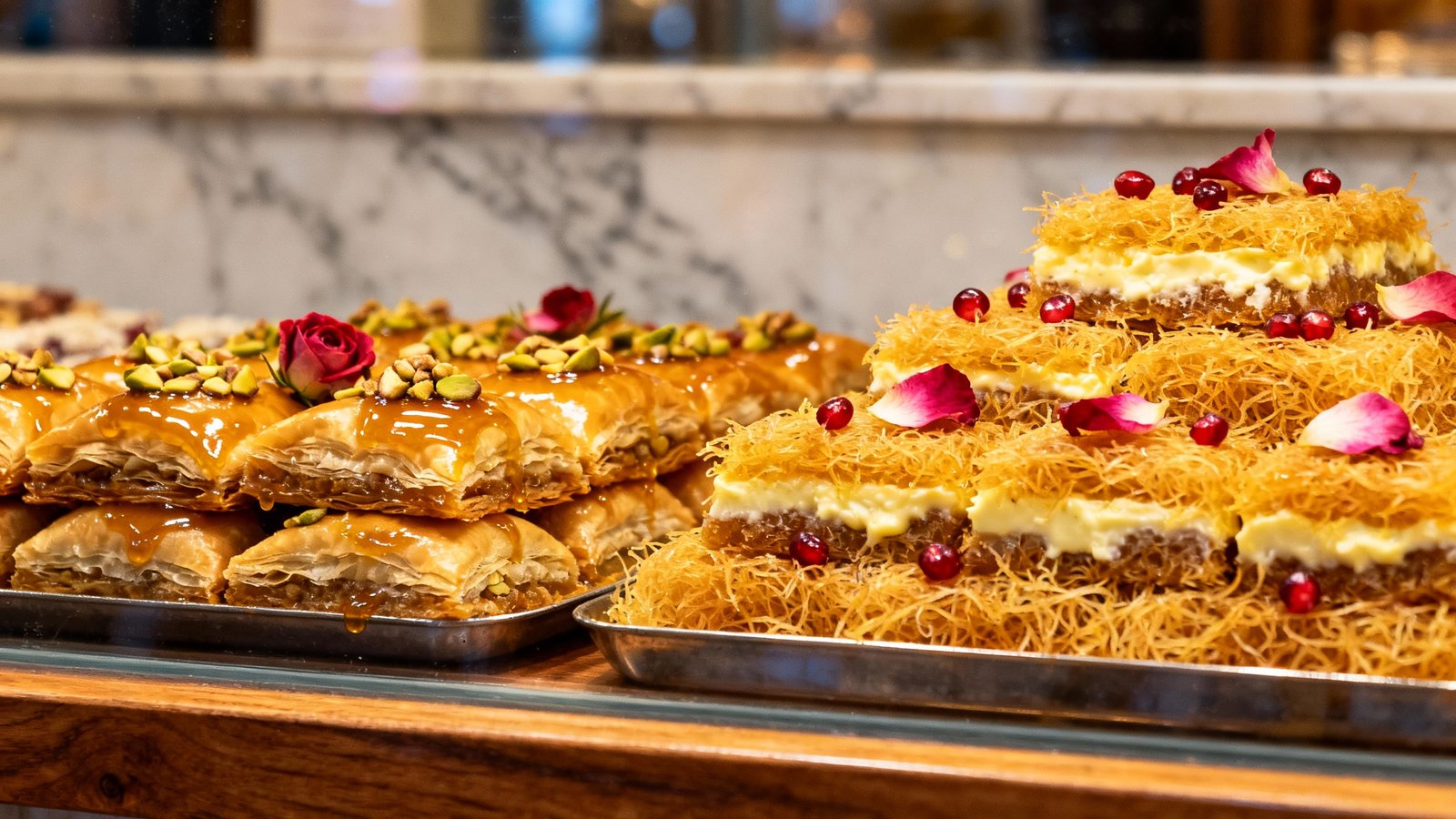
Coffee & Tea Culture
In Dubai, coffee and tea are more than just beverages; they are integral parts of the culture and symbols of hospitality. The most traditional is Gahwa, or Arabic coffee. This is a lightly roasted, spiced coffee, often flavored with cardamom and saffron. It is served in small, handleless cups and is always offered to guests as a sign of welcome, usually accompanied by dates.
On the other end of the spectrum is Karak Chai, a strong, milky tea that is the unofficial national drink of Dubai. Its name translates to “strong tea,” and it’s made by brewing black tea with a mixture of spices (like cardamom, cinnamon, and ginger), evaporated milk, and sugar. You’ll find small cafeterias selling this beloved brew for just a few dirhams on almost every street corner.
Beyond these traditional drinks, Dubai has a thriving modern café culture, with specialty coffee shops roasting their own beans and perfecting the art of the flat white. For a taste of tradition in a beautiful setting, the Arabian Tea House in the Al Fahidi district is an iconic institution, serving over 100 different types of tea and coffee in its serene, turquoise-and-white courtyard.
Where to Eat by the Beach
With its stunning coastline, it’s no surprise that Dubai offers a wealth of beachside dining options. There’s nothing quite like enjoying a meal with your toes in the sand, listening to the gentle waves of the Arabian Gulf. From casual cafés to chic beach clubs, there’s a spot for every mood and occasion.
The Jumeirah and Umm Suqeim areas are home to some of the city’s most famous public beaches and, consequently, some of its best beachfront restaurants. Here you can find everything from casual food trucks to upscale restaurants with private beach access. La Mer is another popular destination, a vibrant beachfront development with a quirky, industrial-chic design and dozens of eateries to choose from.
For a truly luxurious beach dining experience, many of the five-star hotels along the coast have their own signature restaurants right on the sand. These venues offer gourmet food, creative cocktails, and spectacular sunset views. A place like Shimmers, located on the private beach of Jumeirah Mina A’Salam, provides an idyllic setting with Greek-inspired cuisine and direct views of the Burj Al Arab.
Budget Eats & Hidden Gems
While Dubai is known for its opulence, it is also a city where you can eat incredibly well on a budget. The real culinary treasures are often found in the older, more established neighborhoods of Deira, Bur Dubai, and Satwa. These areas are home to countless small, family-run eateries and cafeterias that have been serving the local community for decades.
This is where you’ll find some of the best and most authentic food from across the Indian subcontinent and the Middle East for just a fraction of the price of a meal in a hotel. From Pakistani curries and Iranian kebabs to Filipino comfort food, these hidden gems offer a delicious glimpse into the lives of the diverse communities that call Dubai home.
No discussion of budget eats in Dubai is complete without mentioning the legendary Ravi Restaurant in Satwa. This humble Pakistani eatery has achieved cult status, attracting everyone from taxi drivers to celebrities with its consistently delicious and incredibly affordable food. Ordering the chicken tikka, mutton peshawari, and a stack of fresh bread is a quintessential Dubai experience that proves great food doesn’t have to come with a hefty price tag.
Food Tours & Culinary Experiences
If you want to dive deeper into Dubai’s food scene but don’t know where to start, a guided food tour can be an excellent option. Led by knowledgeable local guides, these tours take you off the beaten path and introduce you to the hidden gems and authentic flavors that you might not discover on your own. It’s a fantastic way to learn the stories behind the food and the culture of the city.
Most food tours focus on the older neighborhoods, leading you on a walking adventure through the bustling streets of Deira and Bur Dubai. You’ll get to wander through the Spice Souk, sample street food, visit historic eateries, and cross the Dubai Creek on a traditional abra. It’s an immersive experience that engages all your senses.
Beyond walking tours, you can also find cooking classes where you can learn to prepare traditional Emirati or Middle Eastern dishes yourself. For an immersive experience that takes all the guesswork out of finding the best spots, consider joining one of the many guided food tours available. They offer a curated and delicious introduction to the city’s culinary heart.
Where to Stay for Food Lovers
Choosing the right place to stay can significantly enhance your culinary adventure in Dubai. If you want to be at the center of the fine-dining scene, consider staying in Downtown Dubai or the Dubai International Financial Centre (DIFC), both of which are packed with world-class restaurants. Hotels in these areas often house several acclaimed dining venues themselves.
For those who love beachside dining and a more relaxed vibe, the neighborhoods of Dubai Marina and Jumeirah Beach Residence (JBR) are ideal. This area is filled with a staggering number of restaurants, cafés, and bars, all within walking distance, and offers a mix of casual and upscale options. Staying on the Palm Jumeirah also puts you in close proximity to many luxury hotel restaurants and beach clubs.
To be close to the city’s authentic and budget-friendly eats, a hotel in Deira or Bur Dubai is a great choice. This will put you right in the heart of Old Dubai, with easy access to the souks, street food, and traditional eateries. To be at the heart of the action, you can find the perfect hotel that puts you within walking distance of these culinary hotspots.
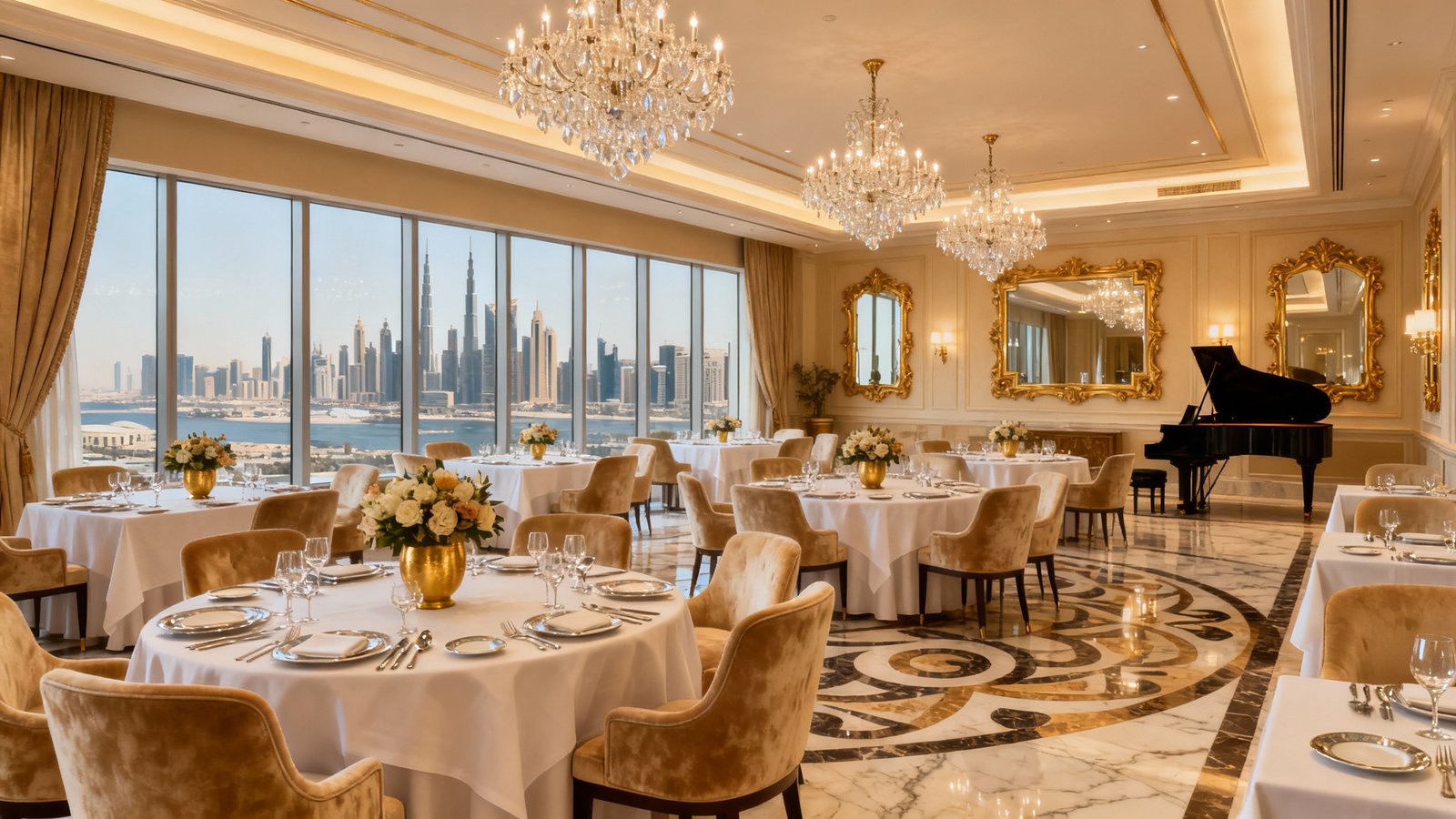
Getting Around for Food Adventures
Navigating Dubai to get to all these delicious destinations is relatively straightforward. The Dubai Metro is clean, efficient, and connects many of the city’s key areas, including Downtown, the Marina, and Old Dubai. However, it may not always drop you right at a restaurant’s doorstep, so be prepared for a short walk or taxi ride from the station.
Taxis and ride-sharing services like Uber and Careem are widely available and are a convenient way to get around, especially at night or when traveling to destinations not served by the metro. They are metered and generally reasonably priced, making them a popular choice for getting from one meal to the next.
For ultimate freedom to explore hidden gems from Deira to Jebel Ali, or to visit food truck parks like Last Exit on the city’s outskirts, renting a car can be a convenient option. Driving in Dubai is on the right-hand side, and the road infrastructure is excellent, though traffic can be heavy during peak hours. Having your own vehicle allows you to create your own food trail at your own pace.
Practical Tips for Food Travelers
To make the most of your Dubai food guide, a few practical tips can go a long way. When it comes to tipping, it is not mandatory but is always appreciated for good service. A tip of 10-15% is a common gesture in restaurants, though many will already include a service charge and municipality fee on the bill.
Understanding the local laws regarding alcohol is crucial. Alcohol is only served in licensed venues, which are typically hotels, clubs, and their associated restaurants. It is illegal to drink in public places, and there is a zero-tolerance policy for drinking and driving. The legal drinking age is 21.
If your visit coincides with the holy month of Ramadan, be aware that dining etiquette changes. Eating, drinking, and smoking in public during fasting hours (from sunrise to sunset) is prohibited. However, many restaurants remain open for tourists behind screens, and the city comes alive at night with lavish iftar (the meal to break the fast) buffets. Finally, while cards are widely accepted, having some cash (Dirhams) is useful for smaller eateries; it’s wise to handle your currency exchange in advance for better rates.
Travel Insurance & Essentials
Embarking on a culinary journey is one of life’s great pleasures, but it’s always best to be prepared for the unexpected. Trying new foods in a different country can sometimes lead to minor stomach upsets or, in rare cases, more serious issues. This is where having good travel insurance becomes invaluable.
Beyond potential health concerns, travel insurance provides a safety net for a range of unforeseen circumstances, such as trip cancellations, lost luggage, or travel delays. Knowing you are covered allows you to relax and fully immerse yourself in the experience without worrying about the what-ifs.
Exploring a new destination is about embracing adventure, and part of that is being a smart traveler. To ensure you can indulge in every dish from shawarma to fine dining with complete peace of mind, securing reliable travel insurance is a non-negotiable part of planning your trip. It’s a small investment for a worry-free and delicious vacation.
Sample 3-Day Food Itinerary
To help you taste the best of the city, here is a sample itinerary that balances traditional flavors, modern dining, and hidden gems.
Day 1: Old Dubai & Creek Flavors
- Morning: Start with a traditional Emirati breakfast at Arabian Tea House in the Al Fahidi Historical Neighbourhood.
- Afternoon: Explore the Spice and Gold Souks in Deira, then cross the Dubai Creek on an abra. Grab a fresh juice and shawarma from a creekside cafeteria for lunch.
- Evening: Enjoy a seafood dinner at a restaurant in Al Seef with views of the bustling waterway.
Day 2: Modern Marvels & Global Tastes
- Morning: Have a leisurely brunch at a beachfront café in JBR or La Mer.
- Afternoon: Head to Time Out Market Dubai for a late lunch, sampling dishes from several of the city’s best homegrown restaurants.
- Evening: Experience fine dining with a view at a rooftop restaurant in Downtown Dubai or the Dubai Marina.
Day 3: Cultural Bites & Sweet Endings
- Morning: Join a guided food tour of Bur Dubai to discover local snacks and hidden gems.
- Afternoon: Enjoy a budget-friendly and legendary lunch at Ravi Restaurant in Satwa.
- Evening: Go on a dessert crawl, starting with kunafa, followed by luqaimat, and finishing with camel milk ice cream at The Dubai Mall.
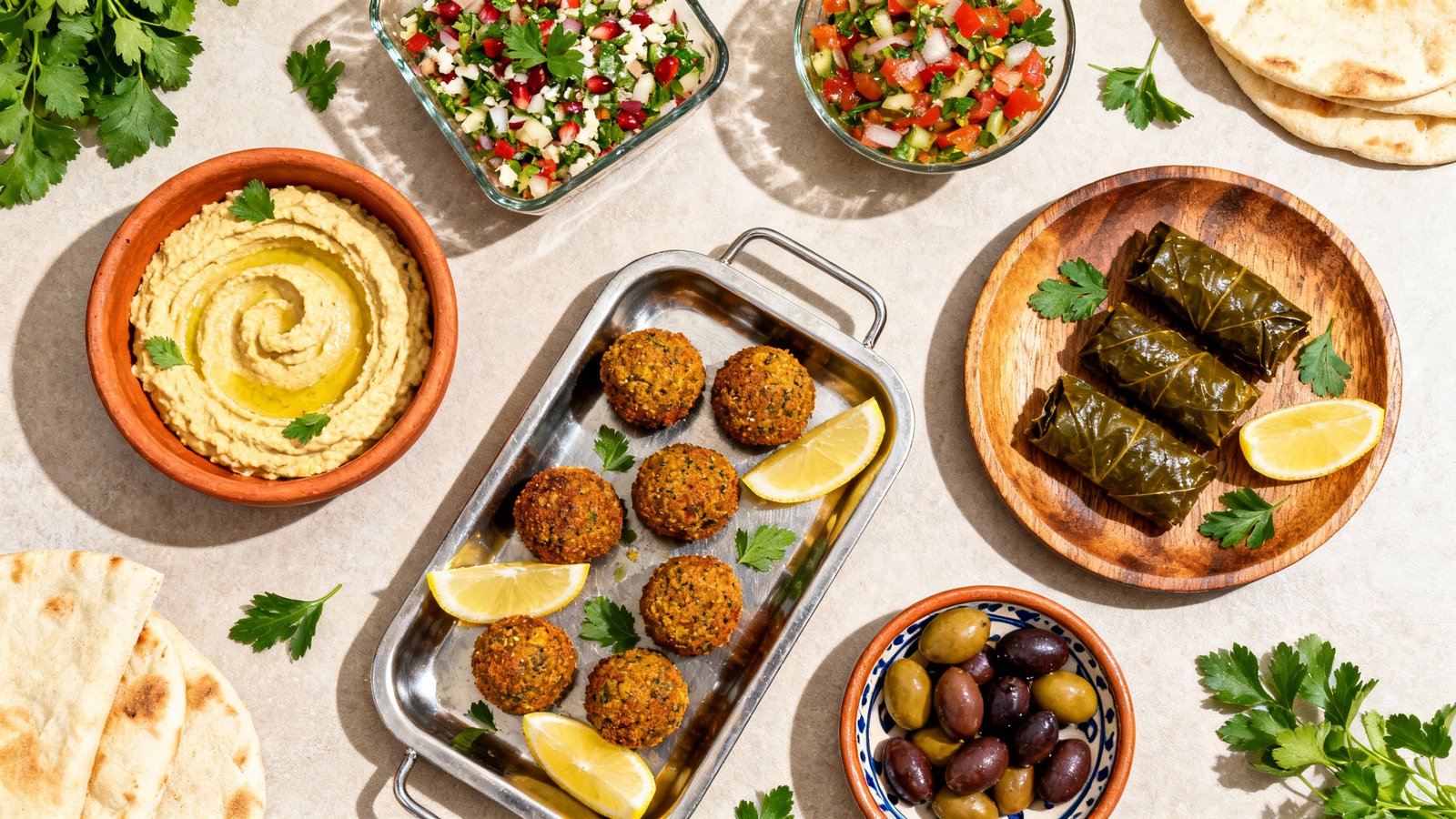
Conclusion
From the fragrant, slow-cooked machboos shared in a family home to the avant-garde creations of a Michelin-starred chef, Dubai’s food scene is a reflection of the city itself: deeply rooted in tradition yet constantly looking toward the future. It is a place where every meal tells a story—of ancient trade routes, of cultural exchange, and of boundless ambition. To eat here is to experience the generosity of Emirati hospitality, the diversity of its global population, and the relentless pursuit of excellence that defines Dubai.
This Dubai food guide has only scratched the surface of what this incredible city has to offer. The true joy lies in the discovery—in stumbling upon a tiny cafeteria that serves the best karak chai you’ve ever had, in sharing a conversation with a chef who is passionate about preserving his heritage, and in that first bite of a dish that transports you to another part of the world. Food is the universal language, and in Dubai, it speaks with a wonderfully diverse and exciting accent.
I hope this guide has inspired you to explore the rich and varied flavors of my city. The culinary adventures that await you are as vast and dazzling as the desert sky. When you’re ready to taste it all for yourself, you can plan your culinary journey with our smart booking tools to create the perfect itinerary.
FAQs
1. What is the national dish of Dubai?
While there isn’t one official national dish, Emirati Machboos is widely considered to be the most iconic and beloved traditional dish. It’s a flavorful spiced rice and meat dish that you’ll find at cultural celebrations and in authentic Emirati restaurants.
2. Is it expensive to eat in Dubai?
It can be, but it doesn’t have to be. Dubai is home to some of the world’s most expensive restaurants, but it also has a massive selection of budget-friendly eateries, cafeterias, and street food stalls where you can eat a delicious meal for just a few dollars.
3. Can you drink alcohol in Dubai?
Yes, but only in licensed venues such as hotels, their associated restaurants and bars, and private clubs. It is illegal to consume alcohol in public spaces, and the legal drinking age is 21.
4. What is the tipping etiquette in Dubai?
Tipping is not mandatory, but it is a common practice and is always appreciated for good service. A tip of 10-15% of the bill is standard in restaurants. Note that some restaurants may already include a service charge.
5. What should I wear when dining out in Dubai?
For most casual restaurants, cafés, and food halls, the dress code is relaxed (though you should always dress modestly out of respect for local culture). For fine-dining restaurants and upscale lounges, a ‘smart casual’ or ‘elegant’ dress code is often enforced—this means no shorts, flip-flops, or sportswear.
6. Is street food safe to eat in Dubai?
Yes, absolutely. Dubai has very strict food safety and hygiene regulations that are enforced across all food establishments, including street food stalls and cafeterias. You can eat with confidence.
7. What are some must-try desserts in Dubai?
Two desserts you absolutely must try are Luqaimat (sweet fried dumplings covered in date syrup) and Kunafa (a warm, cheesy, syrupy pastry). Camel milk ice cream is another unique local treat worth seeking out.


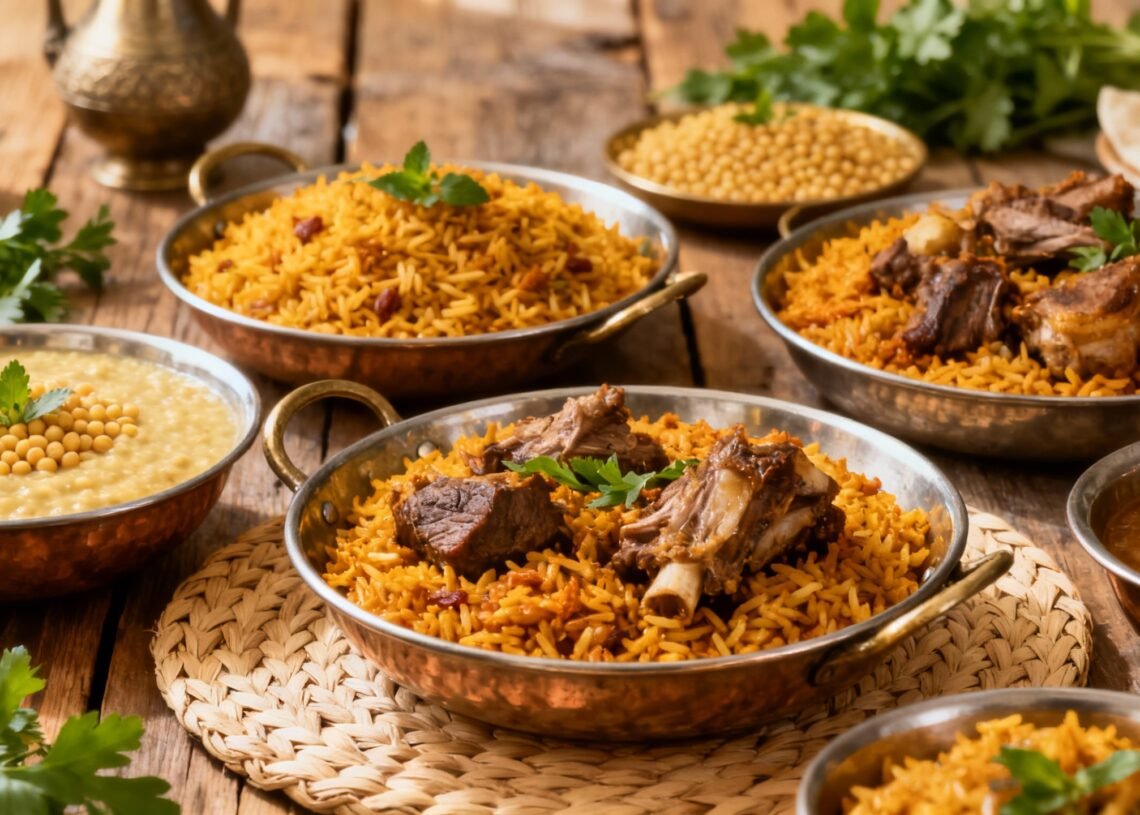
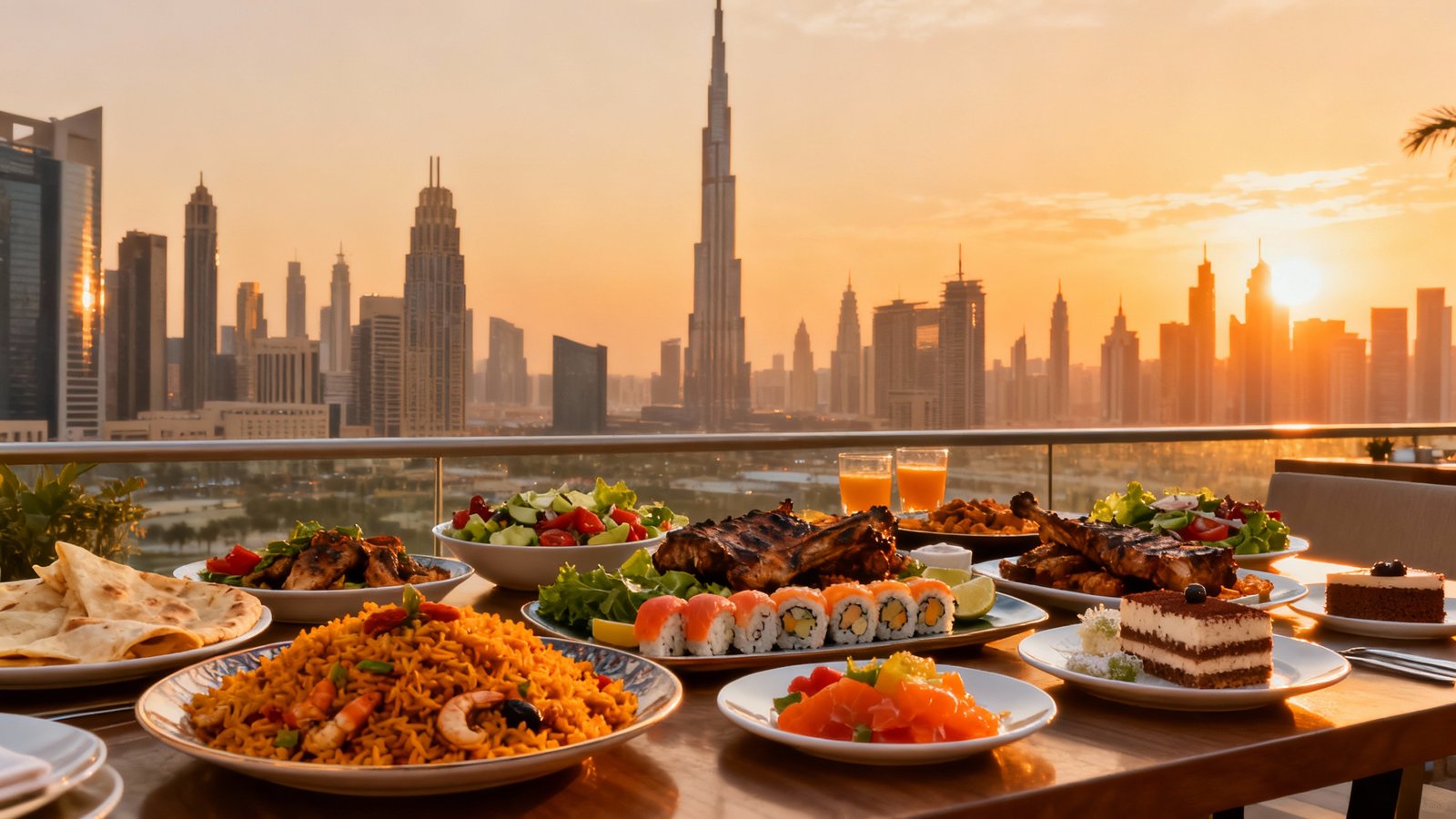 Introduction
Introduction





